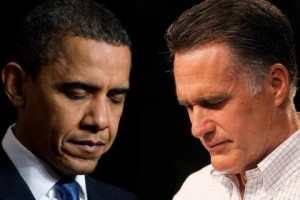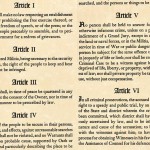 For many people, when they encounter someone of the same religion there’s an instant familiarity and even trust (though that feeling is usually linked to cultural and ethnic cues too.) You see it in how some Irish Catholics feel about Vice President Biden; he’s just like an uncle of theirs. And in how a lot of evangelical voters felt about George W. Bush (but not his father.) Other times, there seems to be a total disconnect between a politician and their religion. I still have trouble wrapping my mind around the fact that Richard Nixon was a member of my former faith, Quakerism, which is known more than anything else for two characteristics: pacifism and always speaking truthfully.
For many people, when they encounter someone of the same religion there’s an instant familiarity and even trust (though that feeling is usually linked to cultural and ethnic cues too.) You see it in how some Irish Catholics feel about Vice President Biden; he’s just like an uncle of theirs. And in how a lot of evangelical voters felt about George W. Bush (but not his father.) Other times, there seems to be a total disconnect between a politician and their religion. I still have trouble wrapping my mind around the fact that Richard Nixon was a member of my former faith, Quakerism, which is known more than anything else for two characteristics: pacifism and always speaking truthfully.
While voting based on faith alone without looking at the candidate’s fitness for office is unwise, I do think it makes sense to weigh it more than most things. Knowing a person’s belief system is the same as your own tells you not just where they probably stand on some issues, but also that their worldview is likely to be aligned with your own.
We live in the immediate aftermath of one the most extreme examples in history of a president’s worldview affecting the choices they made. When W was a candidate, his lack of experience with global politics was discussed, but usually in terms of whether he had the ability to navigate the complexities of diplomacy and negotiate with world leaders. That didn’t turn out to be the issue. What did matter was that George W. Bush viewed life through the lens of a faith that said the world is a spiritual battleground, an active war zone between God and Satan. He saw America as a blessed Christian nation, and thus an Islamic attacker of the U.S. as literally in league with the Devil. Because George W. Bush was our president in 2001, the result of the 9/11 attack was not a global movement to shame terrorism out of existence, but instead a holy war against Islam, from which we’re still trying to extricate ourselves over a decade later.
As someone who was raised atheist and has gone through several religions during my spiritual journey, I don’t have a strong identification as something, and I have a deep respect for the common ground in most faiths. So when I consider the faith of a political candidate, it is not a question of denomination or even religion, but of where their beliefs point.
By current labels, I suppose I’m a progressive Christian, though such labels are problematic because they are so broad. If the president is also a progressive Christian, they’re probably going to have a worldview that includes: seeing human potential optimistically; looking for opportunities to increase collaboration and unity; thinking about social justice, the social contract, responsibility to our neighbor and the “least” among us; a very strong preference for nonviolence; compassion and forgiveness towards criminals, illegal immigrants and former enemies.
All else being equal, I would prefer a candidate with those views, whether they be Christian or something else. But of course, all things are never equal. The main issue is fitness. We can never know what a president will face (again, thinking of 9/11) so my main criteria is that I trust the president to be up to making thoughtful difficult decisions. I will go for a candidate whose ideology I am further from if I believe they will make much smarter choices on big issues.
Deal killer
But there is a collection of faith traditions that’s a deal killer for me. I cannot see myself voting for a presidential candidate who is, for lack of a better word, Manichaean, whether they be Christian, Jewish, Muslim or anything else. Their view would likely include: seeing the world as wicked with our souls under constant siege by negative forces; seeking to maintain order and protect against evil influences with harsh punishments and by turning social taboos into crimes; using capital punishment and war in response to threats.
Former president George W. Bush was of this type. Reports are he was reading and thrilling in the Left Behind series while making global decisions about war against religious enemies. Being heavily influenced by such a black and white take on good and evil, a president can label a group of people “evil”; and see it as the obligation of our “good” nation to wage war against them.
Many conservative Christians also embrace what I would call a puritanical view, which says that those who are good with God will prosper. This can lead them to see those who are not prospering as not being good with God. So their charity can stop before it reaches those people. They may support and promote charities that help people who are willing to proclaim a belief in Christianity, or at least sit through a sermon, and they may do good work beyond that, but they don’t feel an obligation to help those who aren’t helping themselves.
Candidate Mitt Romney’s Mormon faith includes many who see social policy this way. The LDS structure has substantial charity and internal welfare systems and Mormons give more time and money to charity than most Christians, but much of it is directed to other Mormons, or tied to missionary work, hoping to convert the recipient. While this view towards social policy is not a deal killer, it’s a negative in the mix because it will likely lead to policy positions with which I disagree.
Guided by principles
We’ve had candidates and presidents with no active faith practice, and perhaps no active Christian beliefs, some of whom have even gotten the support of conservative Christians through a mixture of charisma, conservative family values and military service — the last two can serve as stand-ins for faith. I’ll go further. I would be more than willing to vote for a candidate with no active practice or affiliation, and would happily vote for someone from a belief system other than Christianity with compatible values, such as Buddhism or liberal Judaism or Islam. But, as I said in my previous post in this series, I do think it’s important for a president to be guided by spiritual principles rather than cold rationality. And I’d be reluctant to vote for someone hostile towards faith (though I think it very unlikely we’ll have a viable militant atheist candidate for president any time soon.)
Of course, most people and most candidates will be between the extremes of pacifist progressive, Manichaean puritan and militant atheist. I would ask this of a candidate’s faith: Does it point to a loving attitude towards life, filled with humility and gratitude, or a fear-based posture, full of black and white with certainty they are on the side of good?
 Content Director’s Note: This post is a part of our Election Month at Patheos feature. Patheos was designed to present the world’s most compelling conversations on life’s most important questions. Please join the Facebook following for our new News and Politics Channel — and check back throughout the month for more commentary on Election 2012. Please use hashtag #PatheosElection on Twitter.
Content Director’s Note: This post is a part of our Election Month at Patheos feature. Patheos was designed to present the world’s most compelling conversations on life’s most important questions. Please join the Facebook following for our new News and Politics Channel — and check back throughout the month for more commentary on Election 2012. Please use hashtag #PatheosElection on Twitter.
















